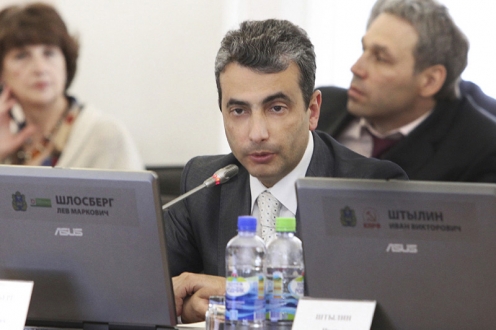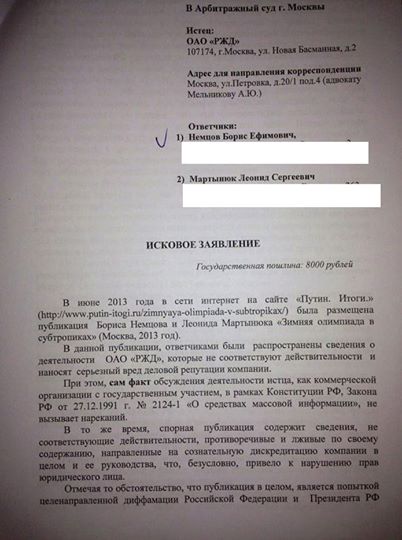Updated Daily. Building on years of Russian journalists’ reporting, Western media are now covering the Kremlin’s paid troll army, citing forums moderators’ experience, leaked documents, and local infiltrators, and uncovering how “web brigades” have been skewing public debate on Ukraine. Authorities are rounding up more suspects in the Bolotnaya Square demonstration case even two years later. Chechen leader Ramzan Kadyrov continues to deny that he has formally sent any Chechen fighters to Ukraine, but now concedes that some Chechen mercenaries may have found their way to the southeast and threatens to send 74,000 volunteers to protect Russia’s interests. Opposition member Boris Nemtsov is being sued by Russian Railways CEO Vladimir Yakunin for his report alleging corruption in the Sochi Olympics. The annual gay parade and related events in Moscow were broken up by riot police and several detentions were made. The funeral of Andrei Mironov, the translator slain in Slavyansk, was held in Moscow.
For last week’s issue on the critical review of Glenn Greenwald’s book No Place to Hide by noted Russian intelligence and cybersecurity expert Andrei Soldatov; another court case lost by an NGO challenging the prosecutor’s designation of “foreign agent”; the Russian Constitutional Court ruling that a gender studies center was exempt because scholarly work was excluded from the definition; commentary by former Central Bank official and Kremlin critic economist Sergei Aleksashenko about how the West has deliberately made sanctions against Russia ineffective; threats of jail for Navalny for using the Internet; and a billboard campaign against the opposition as “fifth columnists,” go here.
For the previous week’s issue on the killing of Andrei Mironov, the Russian translator and Italian journalist Andreas Rocchelli in Ukraine; Memorial Human Rights Center’s court case challenging the prosecutor’s designation of “foreign agent”; the Chinese-Russian gas deal; debate on journalists embedding with insurgents following capture and release of LifeNews reporters; and Russian liberals’ concern about blow-back to Russia itself of Putin’s aggressive nationalism, go here.
Please help The Interpreter to continue providing this valuable information service by making a donation towards our costs.
June 7, 2014
2015 GMT: Here’s something nasty from a popular Russian Twitter account that purports to be run by Vladislav Surkov, top Kremlin advisor often referred to as the “grey cardinal of the Kremlin”. It’s directed at the newly-elected Ukrainian President Petro Poroshenko, who was inaugurated today:
Если вместо Зурабова послать на инаугурацию в Киев баллистическую ракету, церемония пройдёт куда ярче и зажигательней…
— Сурковъ (@SurkovRussia) June 5, 2014
Translation: @SurkovRussia If instead of Zurabov [Russian ambassador to Ukraine] we sent a ballistic missile to the inauguration in Kiev, the ceremony will be a lot flashier and more incendiary…
Surkov was out of favor for a time when Prime Minister Dmitry Medvedev’s Skolkovo project was investigated for corruption and resigned under pressure from his post as deputy prime minister in May 2013. Then he was brought back before Putin’s war on Ukraine as his aide in charge of Abkhazia and Southern Ossetia, but he is believed to be involved in Ukraine and was included in US sanctions against Russia over the forcible annexation of the Crimea.
The account is not verified through Twitter’s checkmark system, and Surkov himself, when quizzed, has been enigmatic. He has
0629 GMT: Dmitry Rogozin, the deputy prime minister in charge of defense and the space program, has applauded the proposal to re-name Volgograd to Stalingrad.
Никогда не сомневался в необходимости вернуть великому Сталинграду его имя http://t.co/NverjR6NI6 Не ради Сталина, а ради сталинградцев
— Dmitry Rogozin (@Rogozin) June 7, 2014
Translation: @Rogozin I never doubted the need to return to great Stalingrad its name. Not for the sake of Stalin, but for the sake of the Stalingraders.
Rogozin linked to an article on the news site 2×2.su headlined “People Want to Rename Volgograd to Stalingrad, Putin Not Opposed”
A war veteran in Volgograd appealed to Putin to rename the city, and the president said he “could not rule out such an option and only advised holding a referendum.”
“‘In accordance with our law, this is a matter for the subject of the federation and the municipality,’ ITAR-TASS cited the president as saying.”
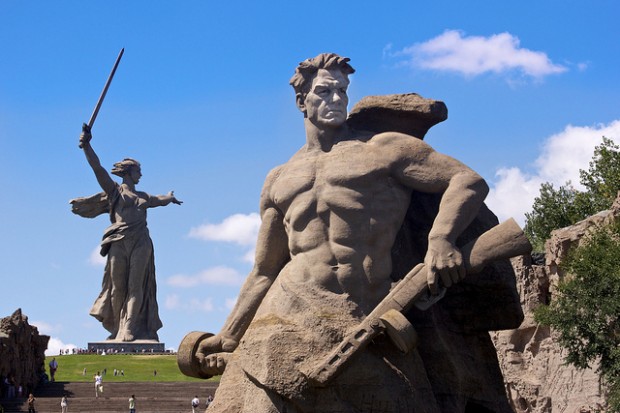
“The Motherland Calls,” a statue in Volgograd commemorating the Battle of Stalingrad, designed by Soviet sculptor Yevgeny Vuchetich and structural engineer Nikolai Nikitin. Photo by Jacopo Romei
Putin said that it was up to residents of the city, and whatever they say, “we will do.”
He justified the move by saying that Paris has a Stalingrad Square and other cities in Europe have memorialized the name of the location of the World War II battle which was a turning point in the fight against the Nazis.
Komsomolskaya Pravda reported that the president’s office has received a petition with 50,000 signatures requesting that the city be re-named Stalingrad, as it was from 1925-1961.
At least one comment was posted on the news article by an anonymous reader with the nick-name Alter Ego:
“Ah, short memory? Have they already forgotten how many people this murderer put in the grave? There is not a single family that has not lost relatives from Stalin. Tens of millions of people were put in the grave by this cannibal.”
June 6, 2014
1657 GMT: The “Kremlin trolls” story seems to have taken a number of influential news sites by storm — and now even spawned a backlash. It’s a compelling notion — that the hordes of anonymous Internet commentators who post such hateful drivel on so many comment sections are really organized and deployed by the Kremlin. And it’s not difficult to show the social-engineering and sheer repetitive nature of this phenomenon and characterize it as indeed orchestrated by some power with ill intentions. Yet the story is now a lot like the Snowden saga — no one can exactly prove that he is a Russian agent, so nobody is supposed to talk about the glaring fact that he is under total FSB control any more for fear of McCarthyism.

Soviet-era singer Edvard Khil became an unwitting Internet meme with his “tro-lo-lo” video on Youtube. To add to the curiosity, it turned out he had substituted the vocalization to avoid Kremlin censors who disapproved of the song’s lyrics about an American cowboy.
The latest round of the “Kremlin troll army” story actually started in 2012, when Kalmoth, a blogger at the left-leaning Daily Kos picked up the story in a post 6 February 2012, persuaded that Kremlin-funded youth groups were really behind the “web brigades” phenomenon. He translated Russian media articles on the story and found the YouTube posted by “Anonimusy,” the group modelling itself after Anonymous in the West — imitating the same robot voice and graphics — and came up with names:
“Hackers broke into the email accounts of Kristina Potupchik, a spokeswoman for the pro-Kremlin Nashi youth movement, Vasily Yakemenko (Russian Federal Youth Agency chair), and Oleg Khorokhordin, one of the administrators of the office of President of Russia. The Russian version of Anonymous claim responsibility for the hack.”
The next day (7 February 2012), Miriam Elder, then at the Guardian, published a story, Hacked E-Mails Allege Russian Youth Group Nashi Paying Bloggers
“The Russian youth group Nashi [Ours] has paid hundreds of thousands of pounds to a vast network of bloggers, journalists and internet trolls to create flattering coverage of Vladimir Putin and discredit his political rivals, according to a haul of thousands of emails allegedly sent to and from the group that have been released by Russian hackers. The online hacker movement Anonymous claimed to Gazeta.ru that they had carried out the hack, although it’s rare that Anonymous, associated with WikiLeaks and other radical anarchist movements, attacks Russia.”
“The mass of data appears to show evidence of the sinister tactics used by Nashi,” wrote Elder. Nashi’s leader brushed off the revelation.
Then the Times of London pushed the story further in a piece 11 October 2013, revealing that Russian reporters, posing as job applicants had uncovered a company in St. Petersburg called the Internet Research Agency where an employee was told to slam opposition politician Alexey Navalny in four blog posts a day for a modest fee.
Then the Guardian came back to the story again with a piece by Chris Elliott 4 May 2014, “The Reader’s Editor on Pro-Russia Trolling Below the Line on Ukraine Stories”, noting “Guardian moderators, who deal with 40,000 comments a day, believe there is an orchestrated pro-Kremlin campaign.”
“Trolling covers a multitude of sins but a particularly nasty strain has emerged in the midst of the armed conflict in Ukraine, which infests comment threads on the Guardian and elsewhere, despite the best efforts of moderators. Readers and reporters alike are concerned that these are from those paid to troll, and to denigrate in abusive terms anyone criticizing Russia or President Vladimir Putin.”
They got the story right, even if their photo was reversed (we’ve put it right below); it shows the banner of a state-sponsored group supporting Medvedev for president with the slogan “My Vote is For Medvedev”. (The word in Russian golos can mean “voice” or “vote,” but this printed sign hardly seemed spontaneous.)
It was complaints from readers, frustrated with the enormous number of pro-Kremlin comments on Guardian articles, which are famous for thousands of commenters, that got the editors to take a closer look. This article also cited the Guardian‘s experienced former Moscow correspondent, Luke Harding, who said such orchestrated campaigns were “a well-attested phenomenon in Russia.”
While the phenomenon appeared to be documented, the moderators concluded that the suspicion that such “bots” or “astro-turfers” as they have long been known in the US — fake grassroots’ commoners expressing supposedly genuine opinions — was poisoning the well. People would accuse each other of being Kremlin “sock puppets” and were “usually wrongly,” said the Guardian.
1554 GMT: Buzzfeed‘s Max Seddon put further investigative muscle into the “Kremlin’s Troll Army” story with “Documents Show How Russia’s Troll Army Hit America” and “New Leaked Documents Show Russian Trolls Targeting Obama, Harry Potter Fans.” Seddon obtained documents hacked by a group calling itself Anonymous International, which he said was “apparently unrelated” to the online movement using the same name. The hackers revealed that despite the fading of the “Nashi” era (as the discredited group began to be replaced by other state-controlled movements), trolling was still a paid profession, although the rates had declined necessitating more work for less pay — 10 accounts with 50 tweets a day and 2,000 followers each, and five posts a day on comments’ sections.
“Foreign media are currently actively forming a negative image of the Russian Federation in the eyes of the global community,” one of the project’s team members, Svetlana Boiko, wrote in a strategy document. “Additionally, the discussions formed by comments to those articles are also negative in tone.
“Like any brand formed by popular opinion, Russia has its supporters (‘brand advocates’) and its opponents. The main problem is that in the foreign internet community, the ratio of supporters and opponents of Russia is about 20/80 respectively.”
Seddon found the Internet Research Agency covered by the Guardian was still active and interviewed a man who was said to be the project’s leader, Igor Osadchy who launched the effort employing hundreds of people in April 2014. Yet he denied every working for such a company and called the claims “a provocation.”
Leonid Bershidsky, a Bloomberg View columnist dismissed the dodge, commenting bluntly for Buzzfeed, “If it looks like Kremlin shit, smells like Kremlin shit, and tastes like Kremlin shit too — then it’s Kremlin shit.” Reported Buzzfeed:
“The trolling project’s finances are appropriately lavish for its considerable scale. A budget for April 2014, its first month, lists costs for 25 employees and expenses that together total over $75,000. The Internet Research Agency itself, founded last summer, now employs over 600 people and, if spending levels from December 2013 to April continue, is set to budget for over $10 million in 2014, according to the documents. Half of its budget is earmarked to be paid in cash.”
Then Moscow Times addressed the issue again in a story “The Kremlin’s Trolls Go West” by Ilya Klishin making the forthright claim that Vyacheslav Volodin, the Kremlin’s first deputy chief of staff “according to sources close to the presidential administration” had invaded the US blogosphere and media comments’ sections with a Kremlin troll army.
Volodin outsourced the job to Russian expats in Germany, India and Thailand, which may explain the poor grammar and spelling by non-native speakers. Particular attention went to the Huffington Post and other liberal news site with the highest traffic in the US. The troll commanders registered accounts “gradually and purposefully” so they would look authentic and went to work trying to influence opinion on Ukraine. They were having trouble because US readers began to suspect that the trolls were paid.
1328 GMT: Caitlin Dewey, a culture blogger at the Washington Post picked up the “Kremlin Troll Army” story 4 June, but despite the extensive amount of research and hacked documents from multiple news organizations for the last two years, concluded that in fact the Post was not likely a target. To be sure, she cited the Buzzfeed stories, but for some reason, concluded that the marketing firm Internet Research Agency had “very distant ties” to the Kremlin, although ties to United Russia, the ruling party, and the Kremlin-managed youth movement Nashi and other groups are hardly distant. The Post‘s findings:
“The Post hasn’t, for the record, been able to conclusively verify Buzzfeed’s reporting or review the original documents from an “anonymous hacker collective” that reporter Max Seddon cited in his story. Nevertheless, we couldn’t let these simultaneously menacing and hilarious allegations of overseas trolling stand! And so, armed with some healthy skepticism and the descriptions of the trolls’ behavior in Seddon’s piece, I — along with the Post’s commenting overlords, Julia Carpenter and Beth Butler — set off to hunt some trolls.
But while the Washington Post moderators dug up some posts that sounded like they fit the profile — bad grammar and obsession with anti-Americanism and Russian patriotism, they didn’t find very many. They concluded:
By and large, however, these trolls weren’t any trollier than some of the other more disruptive denizens of the Post’s comments section, most of whom provide their services — we assume — for free. In fact, while a few of the apparent trolls had comments deleted for violating Post policies, the group as a whole never stood out from the other commenters the Post flags daily. (… which, come to think of it, may say something profound about the caliber of online discourse.) ‘We didn’t immediately pluck them out from the crowd as mastermind spies,’ is how Julia put it.”
Dewey then highlighted her unfamiliarity with the broader issues in Russia’s propaganda campaigns by making a moral equivalence between the Kremlin troll army and the US State Department, despite the obvious differences in methods and content:
“This is all anecdotal, of course, but it supports observations that have been made about similar international trolling efforts before. It certainly merits comparison to the U.S. State Department’s “Digital Outreach Team,” which dedicates itself largely to trolling jihadists in Arabic, Punjabi, Somali and Urdu-language forums, as well as on Facebook, Twitter and YouTube.”
The Washington Post may not have spent the time and resources on the Kremlin story that the Guardian and Buzzfeed did, but another phenomenon may underlie the debate. The Guardian is in a political context where leftist parties are elected to parliament and a calibrated political discourse exists where some elements of the left and liberal parties will take pains to disassociate themselves from the Kremlin both in its communist past and its fascistic present, to maintain credibility. To be sure, former anti-communists in conservative parties now embrace Putin, which can make it confusing, but the debate itself about who is a Kremlin sympathizer is legitimized.
In the US, with both the legacy of anti-communism and “anti-anti-communism” there is still a lingering liberal distaste for criticizing and confronting those who admire Putin or accept his world views for fear of seeming to create a climate of “McCarthyism”.
Thus we are probably at the end of the latest cycle of “Kremlin troll” stories because hacked documents from firms with “very distant relations” from the Kremlin weren’t persuasive enough for the DC establishment. By the time we get to TechPresident, the story is now about how Kremlin trolling is all too obvious and the real news is that Fox News has picked it up — that is, we are now into not backlash but antithesis.
1200 GMT: A flurry of articles in the Western press about the “Kremlin’s troll armies” barely touched on the very likely management of propaganda campaigns from the FSB and other intelligence agencies, and none of them discussed RT.com, the largest troll of all (see The Interpreter‘s regular column by Adam Holland). Instead, the focus was on contracted PR farms that the ruling party and state-sponsored youth groups ran — but without establishing that they had intelligence connections.
The war against “Kremlin trolls” — if anyone is willing to declare it — is not going to be won by exposure of its paid nature if the risk of unfair accusation always lurks in the background — which is just how the Kremlin troll masters like it, of course.
So it’s also good to look at the functional aspects of pro-Kremlin trolling, the patterns of ideology and methods so that regardless of the provenance of the troll, they can be identified and countered. But it’s precisely this approach that Kremlin operatives have worked hardest at stamping out in the West.
The history of this story for the English-language media apparently begins first with a series titled “Commissars of the Internet” in 2007 on La Russophobe’s blog, then a seminal piece posted at opendemocracy.net on 19 March 2009 by Anna Polyanskaya, Andrei Krivov and Ivan Lomko, The Kremlin’s Virtual Squad, analyzing the trolling even before the current Putin presidency, when it has grown worse (their work goes back to 2003 in the Russian-language press). Polyanskaya, once an aide to parliamentarian Galina Starovoitova and a prominent journalist in Russian media in its more independent days, eventually emigrated to France with her husband, Krivov, and Lomko emigrated to the US.
Polyanskaya’s work on trolls goes back to 2003, when she published the first essay on this topic titled “Virtual Eye of Big Brother” at Vestnik with Andrei Krivov and Ivan Lomko a later version of which was translated here and here.
Although the authors start the clock on study of forums in the Internet age, the phenomenon of the Kremlin’s orchestration of mass letter-writing campaigns against dissidents like Andrei Sakharov and his wife Elena Bonner existed as far back as the 1960s and 1970s, when the KGB and state media incited seemingly-authentic sentiment among “outraged workers,” who then wrote letters to the editor or even directly to the state’s targets.
Polyanskaya and her colleagues start with a simple, factual realization: lack of integrity of voting, and how that makes peer review impossible:
“For example, today 80% of participants on all web forums criticize the USA aggressively and monotonously. But on sites where you can only vote once from one computer, 84% of Russian speaking internet users support the USA…You find the same with attitudes to the Chechen war, support/criticism of the Kremlin policies etc. Wherever voting is protected, wherever it is not possible to vote several times, surveys come to exactly the opposite conclusions from those on sites that are “unprotected” from repeat voting.”
The authors identified the characteristic of trolls relevant today:
o 24/hour/7 day availability — which — we could add — means multiple people ran the accounts and were likely compensated
o Switching of positions in keeping with changes in official policy
o Yet zealotry when it came to devotion to the head of state and his circle
o Reverence for the KGB or FSB
Then they singled out the trolls’ typical content patterns — they called them “the G Team”:
1. The whitewashing of Stalinism and the rehabilitation of Stalin and his imperial idea of the great Russian people. The cult of Stalin and Dzerzhinsky, the founder of the Cheka. Underestimating the number of victims of the Leninist-Stalinist repressions;
2. A ban on the discussion of the lustration and crimes of the Cheka-NKVD-KGB. The absolute sanctity of this organization from the day of its founding to the present day;
3. Unremitting Judophobia;
4. Loyalty to the present authorities, the cult of Putin, stories about the economic and social prosperity of Russia under his leadership;
5. Promoting the Chechen war “down to the last Chechen”. Stories of “perfidious Chechnya attacking poor Russia”. Mythological tales of the “hundreds of thousands of Russians” killed by Chechens in the early 1990s, before the start of the first war. Two years ago they gave a figure of 20,000 Russians killed – today that figure is already a million;
6. Xenophobia, racism, justifying the actions of skinheads, and pogroms;
7. Savage hatred of deserters and traitors from the ranks of the KGB;
8. Anti-Americanism and anti-Westernism reminiscent of the time of the cold war in its intensity;
9. Nostalgia for the USSR as a totalitarian empire and a great power feared by the whole world;
10. Restoration of Soviet historical concepts and propaganda clichés, excluding only internationalism;
11. Hatred of the intelligentsia, particularly emigrants, seen by the “G team” as “traitors to the motherland”;
12. Hatred of dissidents and human rights advocates, political prisoners and journalists, from both Soviet times and the present day;
13. Hatred of perestroika, its ideology, its personalities and events. Hatred of the time of Yeltsin and Yeltsin himself;
14. The new element in the “G team” ideological arsenal is that all dissidents (or simply dissenters) are accused of “Russophobia”. This is now the equivalent of “anti-Soviet agitation and propaganda”, which was the 70th article of the Criminal Code during Brezhnev’s time.
Five years later, the Putin regime, which was supposed to have only come recently to ideology, still espouses and promotes every one of these planks; we can only add the “Crimea is Ours” sentiment and propaganda drum-beat that the Kiev government is “fascist.”
The authors have a lot more analysis very worth reading for those trying to debate pro-Russian commenters — they call out the interesting characteristics that make them tenancious and persuasive — group persecution of persons identified as “politically incorrect”; a wide political spectrum (with the exception of liberal critics of Putin); creation of clone accounts and posting of disinformation using someone else’s name, so he is discredited.
In addition to this useful article we could also add “Russia: Ideology Becomes a Mash-Up” another piece written at the same time for opendemocracy.net by Evgeny Morozov, the anti-Internet gadfly. Morozov described what he called “the outsourcing of hate” by the Kremlin in the way it incited the masses in the state-controlled media, then let nature take its course
1109 GMT: If we think the “Kremlin troll” phenomenon is bad in the West, in Russia itself, it has made may comments sections unbearable or even led to them being closed as hundreds of rabid haters converge on the mildest critic of Putin and the forcible seizure of the Crimea. In the past, editors tackled the problem more directly; today, they simply close the comments section.
Last year, Novaya Gazeta became so concerned about the issue that it infiltrated its own trolls and found the “farm” where they were being nourished and deployed. The story it published in September 2013 formed the basis for the Times of London story in October 2013.
It was in a house outside of Moscow where Aleksei Soskovets, once involved in Nashi, Molodaya Gvardiya and United Russia ran an elaborate institution with bloggers, social media specialists and commenters in departments with signs on their doors. Technically, his organization is a private business but it seems to have won government contracts from St. Petersburg authorities to run various events and competitions.
1002 GMT: To get an idea of the determined forces arrayed against Anna Polyanskaya and her colleagues — the first to seriously investigate the “Kremlin troll army” issue — have a look at the editing war at Wikipedia on this subject.
First, look at the original version of the “Web Brigades” article created by the Wikipedia editor Elysander (scroll down to the English).
He summarizes Polyanskaya’s article as follows:
Any change in Moscow’s agenda leads to immediate changes in the brigade’s opinions.
Boundless loyalty to Vladimir Putin and his circle.
Respect and admiration for the KGB and FSB.
Nostalgia for the Soviet Union and propaganda of the Communist ideology, and constant attempts to present in a positive light the entire history of Russia and the Soviet Union, minimizing the number of people who died in repressions.
Anti-liberal, anti-American, anti-Chechen, anti-Semitic and anti-western opinions. Xenophobia, racism, approval of skinheads and pogroms.
Accusation of Russophobia against everyone who disagrees with them.
Hatred of dissidents and human rights organizations and activists, political prisoners and journalists, especially Anna Politkovskaya, Sergei Kovalev, Elena Bonner, Grigory Pasko, Victor Shenderovich, and Valeria Novodvorskaya.
Emigrants are accused of being traitors of the motherland. Some members will claim that they live in some Western country and tell stories about how much
better life is in Putin’s Russia.
Before the Iraq War, the brigade’s anti-U.S. operations reached unseen scale. The original publication describes: “it sometimes seemed that the U.S. was not liberating the Iraqi people from Saddam Hussein, but at a minimum had actually launched an attack on Russia and was marching on the Kremlin.” However, it fell silent suddenly after Putin announced that Russia was not opposed to the victory of the coalition forces in Iraq.
Then he summarized their tactics, such as group focus on individual opponents; appeals to the moderators; personal insults, etc. Elysander noted that there was criticism from Alexander Yusupovskiy, head of the analytical department of the Federation Council of Russia (Russian Parliament), who asserted that “web brigades” was a conspiracy theory, in a 25 April 2003 article for Russkiy Zhurnal.
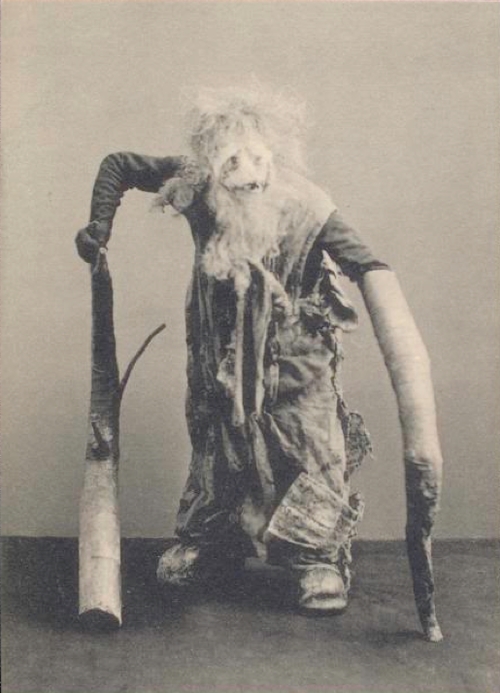
Performer of an elm troll from the play “The Blue Bird” at the Moscow Art Theatre, 1908. Photo via K. Fisher.
Wars on Wikipedia over controversial articles are legendary, and this is part of the genre of arcane skirmishes by anonymous people online. But it is shocking to see what has happened to that entry today; there is no longer a summary of the work of Polyanskaya with criticism for “balance”; the criticism has now become the main argument of the entry.
Worse, while there is a notation that “the neutrality of the article is disputed,” the Kremlin advisors’ version of this story now dominates — the phenomenon of “web brigades” is now only “alleged” and Yusupovsky’s “conspiracy theory” judgment is fronted to the second line of the entry.
To further bolster Yusupovsky’s claims, now the entry sites “political scientist Gleb Pavlovsky,” without explaining that he worked as a Kremlin advisor for many years and continued — albeit qualified — support of Putin and his Eurasianist ideology, a fact that doesn’t emerge very clearly from Wikipedia’s own entry on Pavlovsky and requires additional reading.
And another source deployed to seem authoritative — Sergey Golubitsky from Computerra magazine, claimed essentially that those studying the “web brigades” phenomenon were merely suffering the equivalent of “med students’ syndrome” where aspiring doctors imagine they have the diseases they are reading about in textbooks. In this way the solid research of Polyanskaya and her colleagues who established clusters of ideological positions and clear-cut types of forum warfare was diminished.
To be sure, the entry makes cursory mention at the end of alternative reports on the reporters’ infiltration of the anti-opposition operation in St. Petersburg, but that’s after having set the frame of the topic as a conspiracy. The thrust of such revelations as were mentioned also served to create the impression that they were political operations staged by United Russia and Nashi — some steps removed, therefore, from the FSB.
At this point, “Web Brigades” on Wikipedia is only useful to mark the trail of a long propaganda war from the Kremlin and its defeat of critics. Everyone who follows Eurasia and participates in blog and news site discussions knows there is organized opposition from the Kremlin that is designed to look like spontaneous people’s outrage, and critics targeted by these concerted operations don’t have doubts they exist. Leaks of emails and investigations of political sponsorship ultimately distracted from a greater focus on content and methods and ended up being discounted by Washington Post, then equivocated and diluted by BoingBoing, TechPresident and others. So the Kremlin troll wars continue, even more virulent.
June 5, 2014
1850 GMT: Friends and colleagues were concerned about Anna Sharogradskaya, a prominent St. Petersburg academic specializing in journalism ethics, who was stopped at the airport on her way to the US today. She was supposed to start the summer semester teaching at the University of Indiana in Bloomington, where she has gone every summer since 1989.
But after she cleared passport control, she was summoned over the public address system and interrogated. She wasn’t formally detained — but the search and questioning caused her to miss her flight. Her computer, iPad and USBs were confiscated by border control agents, who said they had instructions from the FSB to do so.
As the hours dragged on, people grew worried — there have been a rash of unexpected arrests recently of opposition and dissenters and several NGOs have lost their court battles against the prosecutor’s office, which has designed them as “foreign agents” under a new law.
Tanya Lokshina, a researcher at the Moscow office of the Human Rights Watch first reported the news of the detention this morning on her Facebook, and now has an update at Huffington Post that Sharogradskaya was finally released today but left in limbo:
“When I spoke to Sharogradskaya on the phone, she told me she wasn’t sure she’d be allowed to leave the country. That was two hours into her detention and she was in total limbo. Her lawyer was on his way to the airport, but officials told her they wouldn’t let him in. They said she did not need a lawyer as she wasn’t officially in detention. So was she free to take her things and leave? Was it her choice to sit there? Missing her flight? Waiting for some mysterious FSB officials? Watching customs officials rifle through her things?
Sharogradskaya’s lawyer arrived after she had been there for three hours. As promised, the officials did not let him in. After another two hours, with the lawyer raising hell, Sharogradskaya was allowed to leave. Her computer, iPad, and memory sticks had been already packed and sealed by the officials, who said they were turning the equipment over to the FSB. The long-awaited FSB representatives never showed up.
A customs officials told LifeNews that the FSB indicated that Sharogradskaya was suspected of smuggling classified documents. She has not been charged, however. In fact, when bidding her farewell, the officials suggested that she exchange her ticket and fly tomorrow. Needless to say, her equipment would stay behind indefinitely.”
Fontanka.ru reported on the story with the headline “Anna Sharogradskaya Did Not Pass the Pulkovo Filter,” giving the name of the airport in St. Petersburg. Widely known in the journalists’ community, the professor, age 73, has not been detained before.
She told fontanka.ru that the border guards took pains to tell her, “this is not us”. Sharogradksaya is director of the Regional Press Institute, which is known for its seminars and conferences on the challenges of working in the predominantly state-run Russian media.
The whole episode seemed designed to intimidate the popular academic without leaving any finger prints. When fontanka.ru called both the local and regional FSB offices in St. Petersburg, agents told them that they had “no relationship to the incident with Sharogradksaya” and sent reporters back to the border guards with their inquiries. Transport police also said they had nothing to do with it, and finally after several hours, the North West Customs Administration took responsibility for the “inspection” which they said was prompted by “questions” about the professor’s baggage.
Sharogradskaya said she was forced to buy a new ticket at her own expense, despite original promises from airport authorities to change her departure without cost. She didn’t want to give up her electronics, but decided to let them go. A customs agent said there was “preliminary information” that the devices might have “information banned from export from the territory of the Russian Federation,” but if they didn’t, they’d be returned. According to Sharogradksaya’s son, Arkady, the devices contained only music, family photos, the text of a book she was supposed to translate, and some press clippings.
The detention follows an appeal by the Regional Press Institute on 26 May to the Kuybyshev District Court challenging the unlawful actions of Deputy Prosecutor Aleksandr Kamensky who was conducting a second inspection of the organization for reasons that were not clear. Earlier a sudden fire inspection was conducted and the organization’s records have been inspected twice. In their complaint, they noted that the documents being requested in connection with the inspection were freely available on the organization’s website or in the media online, and that some of the items requested were not required by the NGO’s charter and they did not have them available.
The inspections come in the context of a wave of declarations of NGOs as “foreign agents” which some, notable Memorial’s chapter in St. Petersburg and its Human Rights Center, losing appeals challenging the prosecutor’s declaration of the status.
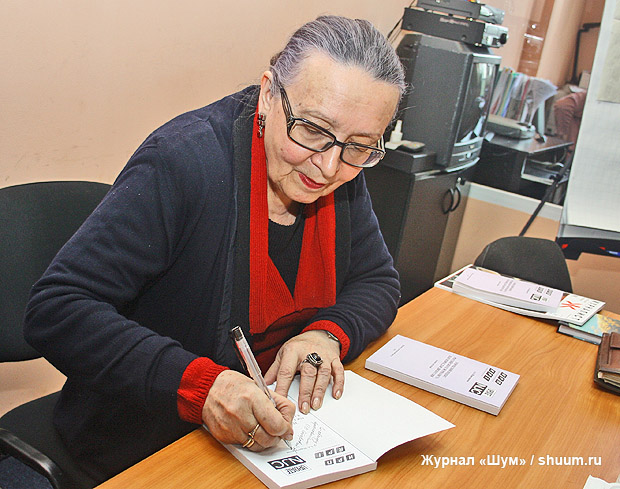
Anna Arkadievna, as everyone called the academic, using the respectful Russian form of address with her patronymic, was famous for applying the American “case studies” method in her work in Russia. One of her best known cases is the story of the lawsuit by the family of Galina Starovoitova, a liberal Soviet parliamentarian assassinated in 1978 by a former intelligence officer and his hitman.
The pro-government Komsomolskaya Pravda reported falsely that she was killed “over a million dollars” and it has been very difficult to eradicate this falsehood from the public record despite a trial of the murderers that found they were politically-motivated due to her exposure of mafia-related corruption. “Waves continue from the stone thrown by Komsomolskaya Pravda to this day,” said Sharogradskaya in an 2011 interview.
1850 GMT: “Five Million for the Bridal Basket,” runs the snarky Izvestiya headline about the meeting between US President Barack Obama and the newly-elected Ukrainian President Petro Poroshenko today.
Then comes the snide — and racist — sub-head.
“Journalist Mikhail Shakhnazarov on the Long-Awaited Meeting of the Two Chocolate Presidents”.
Poroshenko owns the confectionary company Roshen, famous for its chocolates. With its racist slur against Obama, Izvestiya’s Shakhnarazov is following a tradition of other Russian nationalists and anti-American haters of all political stripes. For example, Irina Rodnina, a famous figure skater selected by Putin to light the Olympic flame, infamously posted a picture of Obama and First Lady Michelle as monkeys eating bananas. She’s the mother of Alyona Minkovski formerly an RT.com anchor and now at Huffington Post — and apologized for the offensive remark, claiming she was hacked, although her story didn’t add up.
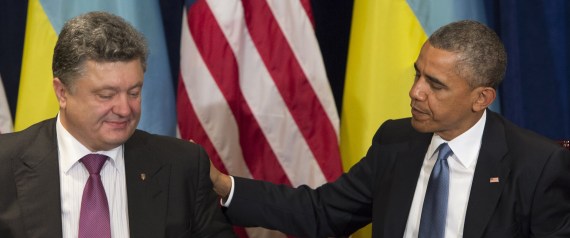
US President Barack Obama and President-elect Petro Poroshenko of Ukraine hold a meeting in Warsaw, Poland, on June 4, 2014. Photo by Saul Loeb/AFP/Getty Images
The rest of the Izvestiya article is creepy, too:
“Like a young bride awaiting her first wedding night with an envious groom, so Ukraine waited for the first meeting between Petro Poroshenko and Barak Obama. To be sure, it is worth noting that it is hard to treat Ukraine as a young wife, and the president of the USA as an envious husband. As for the rest, everything looking like preparations for a wedding, but the ceremony had not a European but an Eastern color.
The bride had only debts as her dowry and in the end, ruined relations with its largest neighbor; the groom had a bridal gift whose size was what the Kiev authorities were most worried about before the meeting.
There were two meetings.
The first was the handing of the Solidarity prize to the Ukrainian people’s deputy Mustafa Cemilev. Official Kiev immediately distributed scenes recording the visible progressive relations between the two countries: Obama shook Poroshenko’s hand. But the Ukrainian government protocol officers were dismayed.
Three people separated the chocolate king of Ukraine from the chocolate king of America.
But such a seating at the first table of representatives of the democratic world was understandable.
That Dalia Grybauskaitė [Lithuanian president] sitting at the right hand of the ruler from across the ocean had long ago earned the right at least rarely for a time to be at the right hand of Mr. Obama. But that new Ukrainian president could only earn that right in the future. In principle, he was on the right path.
He knew, what the American “keep smiling” was all about. You have to smile in the case of joyful events and in the most unfavorable circumstances. Here under no circumstances should you knit your brows or wrinkle your forehead if the master is smiling. A bloodied woman, crazed from fear and pain who has lost her leg — this was not an occasion to shed a tear for the leader of a nation.”
The last sentence is a reference to one of the victims of Ukrainian shelling in the war against Russian-backed separatists in southeastern Ukraine. The article goes on from there claiming that the “massive, uncivilized murder of citizens” is happening “on orders of a state striving to add to the family of the European Union — instead of the ruler of the Eurasian Union which Ukraine refused to join.
Shakhnazarov goes on to blame Poroshenko for ruining the Ukrainian economy under Yanukovych because he served as minister of economic development and trade for a time — with no mention of the revelations of Yanukovych’s shocking plunder of the state coffers. He also scored Obama’s request of $1 billion from Congress to strengthen the US military presence in Eastern Europe. He goes on to deconstruct the unfolding of events of the last three months, largely caused by Putin’s forcible annexation of Ukraine and ongoing support for violent separatists in Ukraine, as the US saying “You will be under our reliable protection, friends. Poor, hunger, but protected. And most of all you will be protected from good relations from Russia.”
Some people have wondered if Mikhail Shakhnazarov is related to the family of the famous Soviet political analyst Georgy Shakhnazarov and his son, prominent film-maker Karen Shakhnazarov — pro-Kremlin intelligentsia royalty — but he does not appear to be related as their sons have different names.
June 4, 2014
2035 GMT: Yet another participant in the Bolotnaya Square demonstration 6 May 2012 has been arrested more than two years after the fact, Novaya Gazeta reports.
Police came to the home of Oleg Melnikov yesterday, searched his apartment and detained him, his wife reported. His iPad and cell phone were also seized.
As it happened, Melnikov had returned home Saturday from Slavyansk, where he had gone to speak on behalf of the separatists — “a civic position that some people find illogical,” Novaya Gazeta commented. He was puzzled why the authorities were coming after him two years after the fact, and said police asked him, “Why did you overturn the toilets on Bolotnaya?”
Apparently authorities fear a repeat of Maidan in Moscow, and indicated that they have “a lot of suspects” in the case and hinted that some are talking. Opposition members have said that Bolotnaya appears to be turning into a catch-all case to “round up all the usual suspects.”
Melnikov was interrogated at the Investigative Committee and charged with “participation in mass unrest.” He reportedly pleaded guilty and was released after signing a pledge not to leave town.
Melnikov was an organizer of the Anti-Seliger Forum in the Khimki Forest outside of Moscow, the anti-fascist answer to the Kremlin-backed Nashi youth movement’s Seliger summer camp. He also took part in a protest against the razing of a historical building on Bolshoi Kozikhinsy Lane and had started a protest movement called Alterniva which helped victims of trafficking from Central Asia and the Caucasus.
In arresting Melnikov, authorities are not so much investigating the Bolotnaya case as preemptively striking at various civic movements that may pose a challenge especially if related to Ukraine.
On 26 May, police detained Polina Stongina, an activist from a movement called Vesna [Spring] in St. Petersburg, charging her with the Bolotnaya demonstration and then releasing her after a pledge not to leave town. And on 27 May, Dmitry Izhevsky was arrested as we reported.
Lawyers and staff at the NGO Rosuznik [Russian Prisoner] say they believe a “third wave” of arrests in the Bolotnaya Case has now been unleashed. “The investigative group is not going to start working for the sake of two people, one of whom will fall under the amnesty,” Sergei Vlasov, a coordinator for Rosuznuk told Novaya Gazeta. “We must expect more detentions in the near future.”
June 3, 2014
2035 GMT: As Paul Goble wrote recently in Windows on Eurasia:
“Sergey Baburin, a prominent leader of the Russian right, suggests that right-wing political parties in Europe now form a veritable fifth column for Russia on the continent which can be counted on to support Moscow against their leftist governments and against NATO and American policies as well.”
Putin has been actively exploiting the right-wing parties, notably to help seal his victory in occupying Crimea by serving as his international election observers. Some, like Victor Orban, Hungary’s Prime Minister, have been received by Putin in Moscow — although his goals and Putin’s only partly overlap.
Today there is news of an oligarch close to the Kremlin who supports the Russian separatists in Ukraine meeting with far right parties in Austria to discuss ways to preserve traditional values.
Konstantin Malofeyev — the same Malofeyev we wrote about last month involved with political consultant Aleksandr Boroday — organized a closed-doors meeting at Vienna’s Palais Liechtenstein to discuss ways of ridding Europe of “the Satanic gay lobby,” Austrian Times reported, citing Tagest Anzeiger.
Malofeyev’s St. Basil the Great Charitable Foundation brought together nationalists and Christian fundamentalists from Russia and the West. Reportedly, these included Alexander Dugin, the Russian ideologist of the Eurasianist movement, the Russian nationalist painter Ilya Glazunov, and MPs from far right parties including Heinz-Christian Strache of the Freedom Party.
But Strache’s presence was not confirmed. Read more here.
1016 GMT: The Moscow City Prosecutor is investigating Alexey Venediktov, editor-in-chief of the independent radio station Ekho Moskvy and Vitaly Rudensky, editor of the radio’s web site for “incitement of inter-ethnic enmity and denigration of human dignity” under Art. 282 of the Russian Federation Criminal Code, Izvestiya reported yesterday. The orders for the investigation were given by the Prosecutor General’s office at the end of May after a former blogger for Ekho Moskvy, Yuri Shtamov, appealed to the prosecutor.
The claims stem from a tangled blogger’s war between Shtamov, a former prosecutor of the Otradnensky District of Krasnodar Territory and now a citizen of Germany, and Polina Zherebtsova, a writer and poet who authored a book on her experiences in Chechnya.
The story begins when Zherebtsova wrote a public letter to former political prisoner and businessman Mikhail Khodorkovsky, criticizing a statement after his release advocating the preservation of the North Caucasus within the Russian Federation. Zherebtsova described her harrowing experiences as a child in Grozny during the war, and said that due to threats from “patriots” in Russia, she was forced to seek asylum in Finland.
Shtamov replied to Zherebtsova’s piece in another blog post in which he cast doubt on the details of Zherebtsova’s story and her motives. She retaliated by writing a post, “Who Are You, Dr. Shtamov?” in which she called him an “informer” and “Chekist filth” and questioned his own professionalism as a jurist, among other slams.
Shtamov then filed suit against Ekho Moskvy, demanding 3 million rubles in compensation for “moral damages” and a rebuttal of the material from the editors. Ekho Moskvy then discontinued Shatmov’s publications. This caused him then to appeal to the prosecutor to investigate criminal charges. Meanwhile, Zherebtsova has filed a countersuit and says she can back up her claims.
Aleksandr Venediktov, editor-in-chief, has not made any comment on the affair. Libel lawsuits and mutual recriminations abound in the Russian media and blogosphere, but can be exploited by the government when officials are involved or when the Kremlin is looking for excuses to shut down media. Ekho Moskvy has already come under a lot of pressure this year with a change in management and past warnings from Romkomnadzor, the state censor, which led the editors to remove the controversial blogs of Alexey Navalny, Boris Nemtsov and other opposition figures.
Under Russian law, the prosecutor may open a criminal case if an offended party requests an investigation; Shtamov included in his complaint not just matters that he felt were insults to himself or his father, but statements Zherebtsova made in general about Stavropol Territory where he reportedly lived. Stavropol is adjacent to Chechnya, and Zherebtsova has claimed that nationalist movements and hatred for Chechnya are incited in this region in particular because fighters in the Caucasus wars are drawn from there, she says.
Lawyers have told Izvestiya that while bloggers are expressing their personal opinions, the sites where they are published bear responsibility for their publications. Punishment under Art. 282 provides for up to 2 years of confinement or corrective labor for one years. A fine of up to 300,000 rubles must be paid and the offender is banned from certain activities for three years. Part of the investigation involves seeking a “psycho-linguistic analysis” of the statement to see if it in fact constitutes incitement.
In a separate development, the Interior Ministry is now also inspecting a bank transaction made by Venediktov with Sberbank. Oleg Mitvol, the chairman of the conservative Alliance of Greens Popular Party requested that the prosecutor determine the lawfulness of the financing of an Internet site called PublicPost, which existed for 2.5 years, in which Venekdiktov’s company was involved. Mitvol was involved in the dispute with Boris Berezovsky that led to the demise of Novyye Izvestiya.
Increasingly, the Russian government has moved against the independent media, often through enabling seemingly independent third parties, i.e. irate veterans, Russian Orthodox believers, conservative parliamentarians, etc. who create the impression that society is arrayed against the wayward press.
1006 GMT: On his Facebook page, opposition member Boris Nemtsov writes of “Cargo 200,” the code name used since the days of the Soviet war in Afghanistan for the return of bodies of dead soldiers, and uses the term in Russian rossiyanin which means not ethnic Russian, but citizen of the Russian Federation. The Interpreter has translated the comment:
“Coffins are coming to Russia from Ukraine with our killed fellow citizens. In the photo taken by photojournalist Mariya Turchenkova, there is a truck with the sign ‘200,’ crossing the border between Ukraine and Russia. In it are the bodies of 31 killed Russians. You will not hear reporting about this on Channel 1 and NTV. Propaganda claims that there is a civil war in the East of Ukraine, where there are no Russian citizens. A bald-faced lie as usual. A civil war in Ukraine, yet coffins are going to Russia…
On 15 March, we held a Peace March in Moscow. But the war with Russia’s participation continues. People are dying — both Russians and Ukrainians. This hell and nightmare must be stopped. Putin and Poroshenko must be forced to sit down at the negotiation table. Their unwillingness to talk to each other is taking people’s lives away every day. And it is leading the region to a real humanitarian catastrophe.”
Nemtsov links to an Ekho Moskvy photo essay on how the coffins were returned to Russia [warning: graphic].
There, journalists write of the saga of the return of the bodies — mismanagement of the coffins, chaos, and finally a search of the truck at gunpoint at the border before the mission is accomplished. The colorful political consultant Alexander Boroday, the “prime minister of the Donetsk People’s Republic” and a close associate of GRU Col. Igor Strelkov and oligarch Konstantin Malofeyev as we have reported, also figures into this story. The Interpreter has translated an excerpt:
“Toward the end of the day, we were meeting our colleagues in the cafe of the hotel for dinner, when a man from Alexander Boroday’s entourage approached us. Boroday is the prime minister of the self-proclaimed Donetsk People’s Republic.
He said that on the following day, a convoy of two trucks with the bodies would leave from Donetsk for Russia and asked journalists for a favor: to accompany them to the border. He promised to inform us in half an hour where they would be brought and who would accompany the ‘cargo’ and asked us to give him an answer as to whether we consented to go. We were stunned by what we heard.
It was the first admission that in the battles in Donbass, Russian citizens were dying.”
0946 GMT: Chechen strongman Ramzan Kadyrov has simultaneously claimed there are no Chechens officially fighting in Ukraine; admitted that a few might be there as mercenaries on their own steam; and threatened to send “tens of thousands of volunteers” from Chechnya to help protect Russian’s interests.
On 1 June he upped the ante, now saying there were “74,000 Chechens” ready to come “restore order in Ukraine,” lb.ua reported, citing an interview with Kadyrov on the program Nedelya [Week] on Russia’s REN TV.
Kadyrov admitted that 14 Chechens took part in combat in the South East of Ukraine, underscoring that these people were exclusively volunteers who had come ‘at the call of their heart.’ The Interpreter has translated his statements:
“‘I am officially telling you; I have not sent a single Chechen there. If the order is given, we have 74,000 Chechens read to travel in order to restore order on the territory of Ukraine,’ he stated.”
In the words of Kadyrov, there are so many wishing to go that he must ‘hold them back.’
“‘If we didn’t hold them back, there would be not 14 there, but 400 or 4,000…There are a lot of volunteers,’ he said.”
Most threateningly, Kadyrov said that if he really wanted to send soldiers to Ukraine, “they’d know about it not in Donetsk, but Kiev.”
“Why would I sent someone to Donetsk, if the enemies are in Kiev? If we begin to fight them — they are enemies. We can start right in Kiev,’ he said.
0923 GMT: Here’s a full translation by The Interpreter of the statement on Instagram 28 May by Chechen leader Ramzan Kadyrov regarding the issue of Chechens in Chechnya — note that he is now more casual about admitting that there may be some mercenaries among the far-flung diaspora.
“Ukrainian sources are replicating statements that some ‘Chechen divisions’ from Russia have invaded Donetsk. I officially announce that this does not correspond to reality. There are no ‘Chechen servicemen’ much less ‘military columns from Chechnya’ taking part in the conflict. Chechnya is one of the the subjects of the Russian Federation and in accordance with the RF Constitution does not have armed forces. If in the zone of conflict someone saw a Chechen, then that is his personal affair. There are three million Chechens and two thirds of them live outside the borders of the Chechen Republic, including in the West.
We cannot and should not know where is going where, just like they didn’t know in Kiev which Ukrainians went to fight in Grozny. If the authorities of Ukraine really want to see ‘Chechen divisions’ in Donetsk, why go to Donetsk, when there is a good road to Kiev? In fact, we proceed from the fact that Ukraine in the final analysis, as before, will become a country friendly to Russia, because the people of Ukraine are our fraternal people. We really want for peace to reign in the world. Foreign policy is in the competence of the president of Russia and Foreign Ministry. They are making every effort so that fraternal Ukraine returns to peace and stability. We resolutely support this position.Russian President Vladimir Putin is on this issue!”
0906 GMT: The story of the “Chechen fighter” in any war is one most avidly followed by journalists, whether in the Russian-Georgian war in 2008, in Afghanistan, in Syria or currently in Ukraine. The “Chechen fighter” is a kind of meme; when someone invokes the presence of the Chechen fighter, the theory is that the war is taking a brutal turn, or a mysterious turn with strange backers. When Italian journalist Andrea Bocchelli and his interpreter Andrei Mironov were killed last week, people began to say to each other on Facebook, “It’s getting like the Chechen wars” — where many journalists were killed or wounded. Someone would be sure to add, “And complete with Chechens, too.”
Back on May 7, we were first to report in English that Chechen President Ramzan Kadyrov was simultaneously claiming there were “no” Chechens in Ukraine yet threatening to send “tens of thousands of volunteers” if Ukraine did not change its ways. On that same day Ukrainian officers told reporters they believed Chechens were already fighting in Slavyansk with Russian-backed separatists.
The story was repeated but disbelieved by many for weeks; because it is such a hardy perennial in regional journalism, some are inclined to discount the presence of Chechens automatically as an exaggerated cliche, while others seem to want to avoid characterizing Chechens and other peoples of the North Caucasus — who they would prefer to perceive as resisting Putin and his satraps — as instead doing their bidding. Videos taken of “green men” in April in Simferopol in camouflage dancing the lezgvinka, a folk dance beloved by Chechens — were recycled — and photos of Chechens that in fact were taken from years earlier in other locations, easily discounted.
Finally the CNN video in Donetsk last weekend seemed to clinch the question of the Chechen presence — although the reporter asked some leading questions in shaky Russian.
And then the New York Times interviewed fighters who said they were from towns in the Chechen Republic, and even that they were kadyrovtsy — a term that might mean people actually ordered to perform a service by Kadyrov himself, who runs a brutal vertical-command system in his republic, or merely followers of Kadyrov. While there were unchecked rumors of “4,000 Chechens” (based on Kadyrov’s interview on Nedelya citing a theoretical number), suddenly last week there were only a few dozen who could definitely be confirmed — because they had been killed in action.
0900 GMT: A regional expert has challenged the notion of “Vostok” being run by Kadyrov, much less any significant number of Chechens in Ukraine. Mairbek Vatchagaev, a leading specialist on the North Caucaus, of Jamestown Foundation, a conservative think-tank in Washington, DC, published this analysis of the CNN report of Chechen soldiers from the Interior Ministry in Donetsk:
“However, it was not immediately clear from the report if the Chechens were dispatched to Ukraine by the Russian authorities. An armored personnel carrier (APC) carrying the armed men bore the inscription “Battalion Vostok” in large script to make sure it was visible to everyone. The Vostok battalion was disbanded on November 8, 2008, almost immediately after the war in Georgia. As Interfax reported at the time: “The battalions Vostok and Zapad of the 42nd Motorized Rifle Division of the Ministry of Defense of Russia were disbanded,” the deputy commander of Russian Defense Ministry’s ground forces, Colonel-General Vladimir Moltenskoi, told Ramzan Kadyrov in a face-to-face meeting.
Those who like to point to the Vostok battalion should understand that the battalion was led by Ramzan Kadyrov’s worst enemy, Sulim Yamadaev. So Kadyrov would not have allowed his people, the kadyrovtsy, to use the name of the battalion of his former nemesis. Another indicator that the group may not have ties to Kadyrov is the fact that fighters from the so-called Vostok battalion openly smoked in front of cameras—something which would be highly improbable, to put it mildly, in Kadyrov’s units because it is haram (forbidden) in Islam and the Chechen strongman, at least in public, tries to have his subordinates maintain the appearance of being good Muslims.
It is more likely that the Donetsk separatists set up their own version of the “Vostok” battalion that has nothing to do with the original Chechen battalion. The well-known analyst Oleg Kashin pointed out that Chechens once served as bodyguards for Ukraine’s richest businessmen, Renat Akhmetov. According to Kashin, there are Chechens, Ossetians and members of other ethnic groups active in eastern Ukraine.
Proof of the status of “Chechen” also came in the ID of some of the men killed.
“Various news agencies reported that dozens of Chechens were among the victims of the fighting at Donetsk airport on May 26–27. However, Donetsk’s mayor said only eight Russian were killed, including three Chechens. None of their surnames, however, are even vaguely Chechen except for one—that of Murat Lamalievich Dadaev, who might have been a Chechen. Ukrainian media showed the passport of a Chechen who was born in Grozny, but the passport’s owner turned out to have been an ethnic Russian, Alexander Petrovich Yurtaev, who, according to his passport, was born in Grozny but resided in Stavropol region.”
Caucasian Knot found sources that challenged Kadyrov’s claims:
“When they say that there are no Chechens there, it’s a bare-faced lie. Over the last two weeks former soldiers from the Zapad and Vostok spetsnaz battalions, which came under GRU command, have been sent there. There are also some sorts of volunteers from other organisations. No one talks about the losses suffered there, but I know that among the dead there is a resident of our district, from the village of Germenchuk, who was brought home yesterday from Donetsk. There are also dead from Urus-Martan, Gudermes and other places.”
June 2, 2014
1804 GMT: Lev Shlosberg, the deputy from the liberal party Yabloko in the Pskov Region legislature, continues his critique of harsh local conditions for which he blames inept and corrupt leadership. Paul Goble recounts at Windows on Eurasia how the health care system is deteriorating.
Shlosberg was the man to sound the alarm about the impending invasion of Crimea when he noticed that the soldiers and officers of the Pskov 76th Guards Air Assault Division were all missing from their barracks. When the regional governor accused him of being a “fifth columnist” for his criticism of Putin’s invasion of Ukraine, Shlosberg gave an impassioned speech in the legislature, maintaining that the real traitors were the officials right in the region who stole from public coffers, created businesses with public money to enrich themselves, and let public services go to ruin.
1734 GMT: We haven’t heard anything more on threats to shut down Twitter or Facebook, but continued press announcements indicating further responses to Western sanctions and anticipated controls over the Internet do keep coming. Yevgeniya Albats, editor-in-chief of the independent news site New Times, writes that she felt like the news from this weekend read like dispatches from the Cold War. A summary by The Interpreter:
o At Putin’s behest, the Russian Ministry of Finance is making a list of banks that state companies will be obliged to use in order to protect them from Western sanctions. The announcement that Putin was moving his own salary into Bank Rossiya, owned by Yuri Kovalchuk who was placed in the Western sanctions list, may be the start of a trend.
o Starting in 2016, Russians may be forced to use only one Internet provider, Rostelekom, to access state services — in order to keep control over Internet users better. And former KGB agent Andrei Lugovoy, now a parliamentarian — the same man wanted by British authorities in connection with the murder of Alexander Litvinenko –
is now busy promoting a draft law to force news agregators like Yandex to register as if they were mass media.
Like the new requirements for bloggers with more than 3,000 readers to register, the intent is to either force them out of business or co-opt them.
We could add that Rostelekom is also developing its own “pure Russian” search engine, called Sputnik, a Russian word that means “fellow traveler” and was also the name of the first Russian satellite put in space in 1957. The service had 2 million visitors the first day and offers online TV.

Laika, the famous Russian dog sent up into space on Sputnik, the first satellite. Photo by OFF/AFP/Getty.
o The Ministry of Defense has announced a tender to build an information defense system — Russian officials do not want to rely on computers, tablets, smartphones and routers from Western manufacturers.
o The recent failure of the rocket Proton-M could be “pre-meditated sabotage,” says an official, who believes the Russian space program could have “wreckers” in its ranks.
0828 GMT: The British rock band Black Sabbath played a concert in Moscow this past Sunday, but their sound was unexpectedly shut off and the musicians were forced to leave the stage, ITAR-TASS reported.
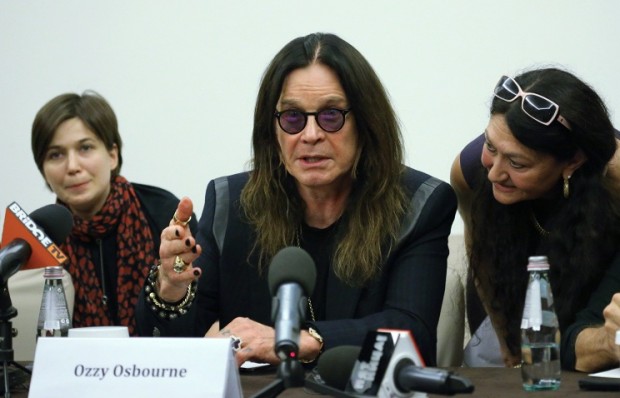
Ozzy Osbourne of Black Sabbath at a press conference in Moscow 1 June 2014. Photo by ITAR-TASS/Anton Novoderezhkin/
Fans speculated that the cut-off was in retaliation for their opening tune, War Pigs, which was seen by some as a statement regarding Putin’s military aggression against Ukraine.
“Do you like that?” Ozzy Osbourne asked the crowd, and upon hearing the roar of “Da!” he continued with his famous anti-utopian song, “Into the Void.”
The band also played “Under the Sun,” which is rarely played at Black Sabbath concerts and a new song from last year, “Age of Reason.” They got through a half dozen more old tunes and some new songs from their recent album “13” before the sound went dead.
Black Sabbath is scheduled to play in St. Petersburg 3 June.
0728 GMT: The funeral of Andrei Mironov, the translator and human rights activist killed in Slavyansk last week, was held in Moscow. Mironov was helping Italian photojournalist Andrea (Andy) Bocchelli who was also killed.
Several tributes to Mironov’s life have been published by journalists for whom he worked on dangerous assignments in Russia’s Chechen wars:
Alice Lagnado of Moscow Times: Killed in Slovyansk, Mironov Sought Out Truth Despite the Costs:
“Mironov was sentenced to four years in prison but released under Soviet leader Mikhail Gorbachev’s administration after serving 18 months. As he told Martin, ‘At the Reykjavik summit with U.S. President Ronald Reagan, he announced there were no political prisoners in the Soviet Union. I watched him say this on the only television set we had in the Gulag.’
After he was released, Mironov went on to work as a human rights activist, including as a member of the human rights group Memorial. He witnessed how the dissidents’ struggle moved above ground after the fall of the Soviet Union and citied Russia’s newly independent media as a major force for change.
‘They are scared,’ he told Baltimore Sun reporter Deborah Stead, referring to the government authorities. ‘A Kalashnikov has a barrel of only 7.62 millimeters, whereas the ‘barrel’ of a television camera is bigger. That is the difference.'”
Kathy Lally and Will Englund of the Washington Post, Remembering Andrei Mironov, the Interpreter Who Tried to Save Russia:
“Andy was a freelancer with more idealism than finances. That resonated with Andrei, who was immersed in a world of ideals. He wanted to help Andy tell the stories he thought the world needed to know. He was oblivious to the physical world and its comforts; he had set off to Crimea in March with one pair of pants. When a seam ripped, he paid no attention.
Andrei devoted his entire adult life to the struggle for democracy and human rights in the Soviet Union and then Russia. When he heard stories of injustice, he alerted journalists, helpful agencies or sympathetic officials, persisting until wrong was righted. When demonstrators turned out in the streets of Moscow to protest rigged elections in December 2011, Andrei was sure that the larger change he had worked for so hard was underway. He was often arrested at demonstrations. He concluded that the police were attracted by his Afghan pakol hat. Andrei wore it anyway.
Ukrainian officials confirmed last Sunday that Andrei and Andy died near the village of Andreyevka, not far from Slovyansk, which armed separatists seized in April. The details are unclear, but Russian media have reported that they were killed by shells launched by pro-Ukrainian “fascists.”
Andrei would not have called the Ukrainian side fascist. He was electrified by the Maidan movement, which began with protests at Independence Square in Kiev in November. Andrei saw the courage of the Ukrainian demonstrators as a model and inspiration for Russia, where Putin had stamped down the democratic movement. He disapproved of the far right in Ukraine but saw it as a marginalized minority.”
Ukrainian authorities denied that they were shelling in the area at the time of the journalists’ deaths, and the pro-Kiev NGO Information Resistance published accounts blaming the separatists for the killings. The driver of their car said they were shot at by gunmen with Kalashnikovs first before being shelled after they took cover. The Italian government and OSCE have called for a thorough independent investigation into the deaths.
0658 GMT: Not surprisingly, given all the hostility to gays coming from the Kremlin, the annual gay parade and related events in Moscow this weekend were broken up by police.
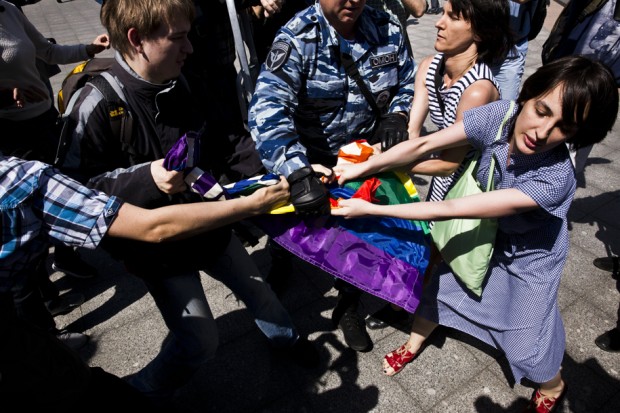
Gay parade in Moscow broken up by riot police, 31 May 2014. Photo by Yevgeniya Fedlman/Novaya Gazeta.
Despite a court ruling that banned their action, demonstrators gathered on Tverskaya Avenue with rainbow flags and played “Rise Like a Phoenix,” the winning song that transgendered Austrian singer Conchita Wurst performed at the EuroVision song contest this year.
Two Moscow courts ruled today the ban of 9th Moscow Gay Pride is lawful! The action will take place without permission as before!
— Nikolai Alexeyev (@n_alexeyev) May 30, 2014
They were met by a Russian Orthodox activist in St. George ribbons and a sign “Moscow is Sodom!” who has come to harass past LGBT events.
Prominent journalist and lesbian activist Yelena Kostyuchenko and a colleague, Anna Annenkova unfurled a flag with the slogan “Marriage, Children, Security” to signify the struggle gays still have in Russia for their rights, particularly to be married and not to have the state remove their children. The two women were detained by riot police and taken away in a police van.
Activists also assembled at the statue of Yury Dolgorukiy across from the mayor’s office and another event took place in Gorky Park. As the participants came out of the metro, young toughs sprayed mace on them and tried to beat them but they fled. Then police stopped women who had painted beards on their faces, and questioned whether their permit was in order as they said their symbols weren’t approved. The Orthodox activist appeared again and accused the activists of carrying “anti-clerical posters”.
The organizers had tied their event to International Children’s Day which is 1 June. They brought 18 young LGBT people who had recently been teenagers and they talked about their lack of rights and problems. Activists said they could not bring actual teenagers because this would violate the law against “propaganda of non-traditional values”. The Orthodox activist appeared with some colorful slogans – “No to Nazism, Trotskyism, and Pederasty!” and accused the LGBT organizers of supporting Ukraine’s Maidan and of being “revolutionaries”.
Other anti-gay activists hurled eggs and a bottle at the gays from the top of Crimea Bridge, and were chased by law-enforcers, but escaped. In the end, police arrested Igor Yasin, the organizer of the event, although the charges against him were not clear.
Gay pride event in Moscow went on as expected – arrests galore. Putin is happy. http://t.co/8vq8zdcNfs pic.twitter.com/iI2Lp4bFrU
— Julia Davis (@JuliaDavisNews) June 1, 2014
0636 GMT: Opposition member Boris Nemtsov, former first deputy prime minister and governor of Nizhny Novgorod Region, is being sued by Vladimir Yakunin, CEO of Russian Railways, for a critical report exposing alleged corruption in the Sochi Olympics, Moscow Times reported.
‘”According to a copy of the lawsuit posted by Nemtsov, the claim stated that the report “contains information that does not correspond to reality” and is “aimed at discrediting the company and its management.”
The suit also described the report as a “well-aimed attempt to defame the Russian Federation and the president of the Russian Federation.'”
The Interpreter published a translation of the report last year.
The lawsuit seeks 3 million rubles ($85,950) in damages for a report titled Winter Olympics in the Sub-Tropics which documented how Russian Railways reportedly siphoned off “nearly $9 billion dollars spent on construction of the most expensive project of the most expensive Olympics” — part of the more than $50 billion in estimated costs to build area infrastructure, sports arenas and facilities, and the Olympic Village. In a comment on his Facebook page, Nemtsov said:
“It’s happened finally! The owner of the fur vault and the friend of Putin V. Yakunin has filed a suit against me and L. Martynyukov in the Arbitrage Court of Moscow. It is a suit in defense of business reputation concerning our report ‘Winter Olympics in the Sub-Tropics’ where we describe how Russian Railways seized nearly $9 million in construction of the most expensive site of the most expensive Olympics — the Adler-Krasnaya Polyana roads.”
Nemtsov notes that in the past, the wife of former Moscow Mayor Yuri Luzhkov, Yelena Baturina, tried to sue him in the same court and failed. “It won’t be boring. I promise you,” joked Nemtsov.
Alexey Navalny also published a report recently alleging corruption at Russian Railways and Reuters recently published a major investigation of billions of dollars funneled by Russian Railways to secret companies.
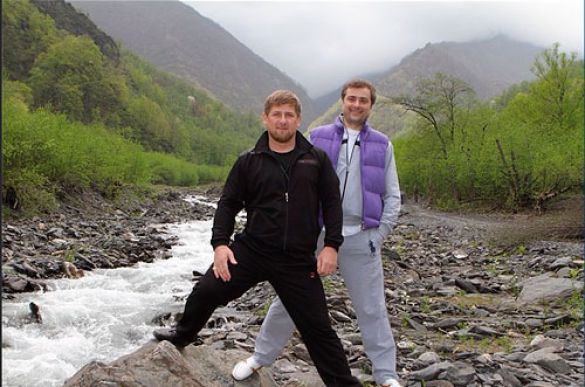
![Nashi rally. Banner: "My Voice [Vote] is for Medvedev". Photo by Yuri Kochetkov/EPA](https://www.interpretermag.com/wp-content/uploads/sites/5/2014/06/Nashi-Rally.jpg)
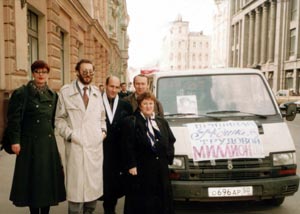
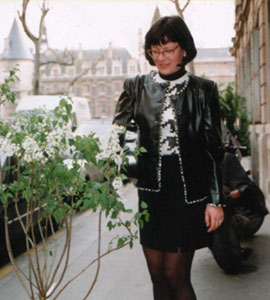

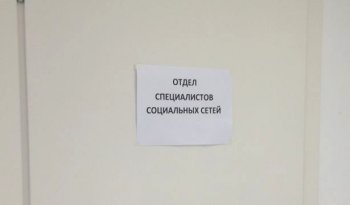
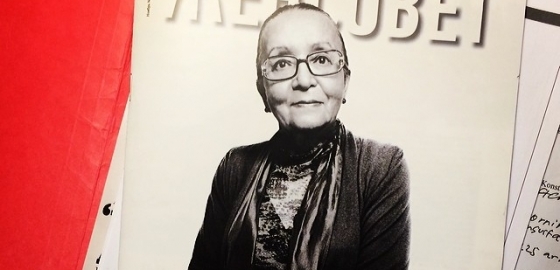
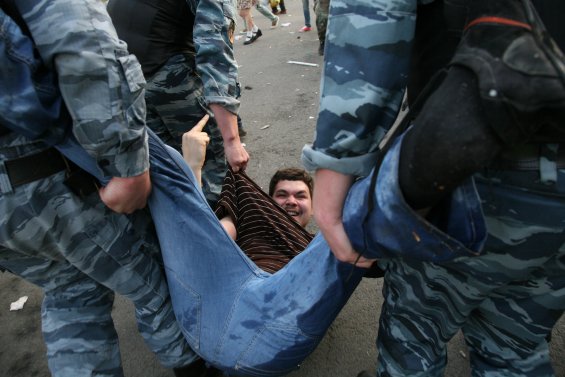
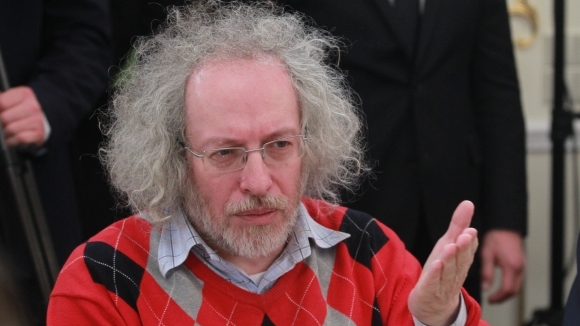
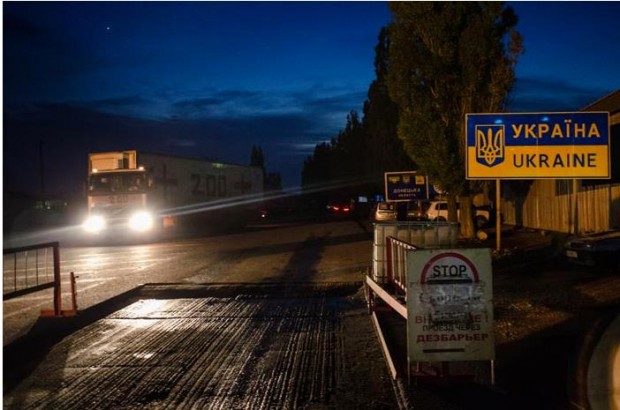
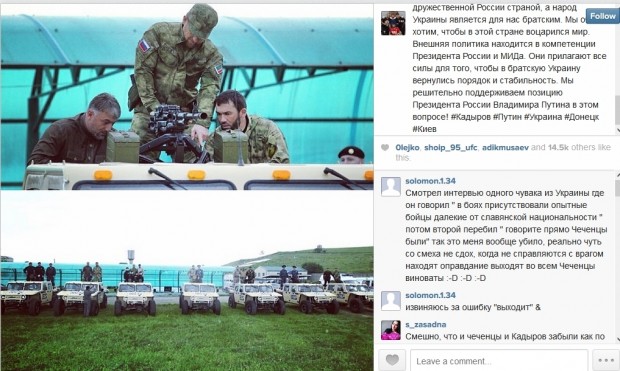
![Armband: "Vostok" [East]. Photo by Paul Glypteau](https://www.interpretermag.com/wp-content/uploads/sites/5/2014/05/140531-vostok-armband.jpg)
